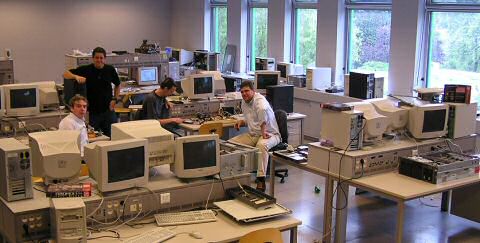Dual CPU Database Server Comparison
by Johan De Gelas on December 2, 2004 12:11 AM EST- Posted in
- IT Computing
Introduction
Despite its incredible importance, it is difficult to find independent hardware advice on database servers. Only a few major hardware and software vendors publish the majority of the TPC and other benchmark numbers. Although a discussion on TPC benchmarks is beyond the scope of this article, it is clear that there is no substitute for independent benchmarking.Benchmarks that vendors provide have a tendency to be to rosy or perhaps even flawed. Vendors may use hardware setups or software configurations that are unlikely to exist in the real world, yet attain the highest score on a particular benchmark. Benchmarking done by Jason and Ross are a notable exception on the internet, of course.
Because many of our readers are interested or are engaged in this field, we started a new databaseserver benchmarking project just a few months ago.
The primary objective of this project is to determine the hardware that makes sense for a database server of small and medium-sized organizations. We tested DB2, and My SQL on SUSE SLES 8 on many different systems based on four different Xeons CPUs and two Opteron configurations.

"Servers are all about large caches and fast I/O." This is a generalization that is heard a lot in the IT community and the cliché has been proven, more or less, to be accurate in the high-end server market. But does this common wisdom also apply to the smaller dual processor systems that act as database servers? Should you pay more for a Xeon that has a healthy amount of L3-cache, or will a less expensive Intel without L3-cache do just fine? Does 64-bit really matter? How important is memory latency/bandwidth? Is a hyperthreaded CPU better equipped when the database is accessed by many users simultaneously?
While we still continue to improve the quality of our benchmarks, we decided to report our first impressions.










46 Comments
View All Comments
smn198 - Thursday, December 2, 2004 - link
Would love to see how MS SQL performs in similar tests.mrVW - Thursday, December 2, 2004 - link
This test seems foolish to me. A 1GB database? All of that fits in ram.A database server is all about being the most reliable form of STORAGE, not some worthless repeat queries that you should cache anyway.
Transactions, logging... I mean how realistic is it to have a 1GB of database on a system with 4GB of RAM and expensive DB2 software.
A real e-commerce site likeMWave, NewEgg, Crucial could have 20GB per year! Names, addresses, order detail, customer support history, etc.
Once you get over a certain size, a database is all about disk (putting logging on one disk indepdent of the daata, etc.). The indexes do the main searching work.
This whole test seems geared to be CPU focused, but only a hardware hacker would apply software in such a crazy way.
mrdudesir - Thursday, December 2, 2004 - link
man i would love to have one of those systems. Great job on the review you guys, its good to know that there are places where you can still get great independent analysis.Zac42 - Thursday, December 2, 2004 - link
mmmmmmm Quad Opterons......Snoop - Thursday, December 2, 2004 - link
Great readksherman - Thursday, December 2, 2004 - link
is that pic from the 'lab'? (the one on pg 1)